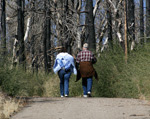Some years ago (more than I want to think about at the moment) I read a book about the propaganda used to influence public opinion. The book covered the period of World War II through Vietnam. One of the examples cited in that book was a piece of American propaganda circulated in the year or so prior to our entry into World War II. The context of the times is largely forgotten by all except students of history. The majority of the American public were opposed to involvement in “Europe’s war", and the Japanese menace seemed isolated to exotic and far away places that didn’t seem important to the average Joe. America’s political leadership had a decidedly more mixed mindset, with a great many American leaders believing it was essential for America to join the fight — essential for our security, as these leaders saw Germany and Japan as looming threats. You may recall that FDR famously (or notoriously) stretched the limits of his authority to the very edge, and pulled all sorts of political shenanigans, to muster support for the Allies in Europe, most especially the Lend-Lease program that proved so vital for England and the Soviet Union.
In that context, a piece of very effective propaganda was circulated in the United States by proponents of America’s entry into the war. I don’t recall whether this was an “official” piece of propaganda, or even if it was of government origin — it may well have been the product of private groups with similar beliefs. The general story line was this: a father stood at a window of his home with his young son, using the neighborhood visible in front of them to explain why it was essential for America to take action sooner rather than later. Hitler, Chamberlain, and the consequences of appeasement were all major parts of the father’s parable.
This morning, my mother sent me an email that’s circulating on the Internet, with a parable that appears to be the direct descendant of that piece of World War II propaganda. Like its ancestor, it features a father and his son, standing at their window, talking about the necessity of active intervention to deal with bad actors on the world’s stage. But this newer version is cast in the present, with Saddam playing the role that Hitler did in the earlier piece, and with the consequences of appeasement and passivity featuring prominently.
Here it is:
The other day, my nine-year-old son wanted to know why we were at war…
My husband looked at our son and then looked at me. My husband and I were in the Army during the Gulf War and we would be honored to serve and defend our country again today. I knew that my husband would give him a good explanation. My husband thought for a few minutes and then told my son to go stand in our front living room window.
He said, “Son, stand there and tell me what you see?"
"I see trees and cars and our neighbors' houses,” he replied.
"OK, now I want you to pretend that our house and our yard is the United States of America and you are President Bush."
Our son giggled and said, “OK."
"Now, son, I want you to look out the window and pretend that every house and yard on this block is a different country,” my husband said.
"OK Dad, I’m pretending."
"Now I want you to stand there and look out the window and pretend you see Saddam come out of his house with his wife, he has her by the hair and is hitting her. You see her bleeding and crying. He hits her in the face, he throws her on the ground, then he starts to kick her to death. Their children run out and are afraid to stop him, they are screaming and crying, they are watching this but do nothing because they are kids and they are a fraid of their father. You see all of this, son.... what do you do?"
"Dad?"
"What do you do, son?"
"I’d call the police, Dad."
"OK. Pretend that the police are the United Nations. They take your call. They listen to what you know and saw but they refuse to help. What do you do then, son?"
"Dad....... but the police are supposed to help!” My son starts to whine.
"They don’t want to, son, because they say that it is not their place or your place to get involved and that you should stay out of it,” my husband says.
"But, Dad… he killed her!!” My son exclaims.
"I know he did… but the police tell you to stay out of it. Now I want you to look out that window and pretend you see our neighbor who you’re pretending is Saddam turn around and do the same thing to his children."
"Daddy… he kills them?"
"Yes, son, he does. What do you do?"
"Well, if the police don’t want to help, I will go and ask my next door neighbor to help me stop him,” our son says.
"Son, our next door neighbor sees what is happening and refuses to get involved as well. He refuses to open the door and help you stop him,” my husband says.
"But Dad, I NEED help!!! I can’t stop him by myself!!"
"WHAT DO YOU DO, SON?” Our son starts to cry.
"OK, no one wants to help you, the man across the street saw you ask for help and saw that no one would help you stop him. He stands taller and puffs out his chest. Guess what he does next, son?"
"What, Daddy?"
"He walks across the street to the old lady’s house and breaks down her door and drags her out, steals all her stuff and sets her house on fire and then… he kills her. He turns around and sees you standing in the window and laughs at you. WHAT DO YOU DO?"
"Daddy...."
"WHAT DO YOU DO?” Our son is crying and he looks down and he whispers, “I’d close the blinds, Daddy."
My husband looks at our son with tears in his eyes and asks him. “Why?"
"Because, Daddy… the police are suppo sed to help people who need them…and they won’t help… You always said neighbors are supposed to HELP neighbors, but they won’t help either… they won’t help me stop him…I’m afraid.... I can’t do it by myself, Daddy . I can’t look out my window and just watch him do all these terrible things and do nothing … so ..... I’m just going to close the blinds … so I can’t see what he’s doing . And I’m going to pretend that it is not happening."
I start to cry. My husband looks at our nine-year-old son standing in the window, looking pitiful and ashamed at his answers to my husband’s questions. He says....
"Son....."
"Yes, Daddy?"
"Open the blinds, because that man...... he’s at your front door… “WHAT DO YOU DO?"
My son looks at his father, anger and defiance in his eyes. He balls up his tiny fists and looks his father square in the eyes, and without hesitation he says, “I DEFEND MY FAMILY DAD!!! I’M NOT GONNA LET HIM HURT MOMMY OR MY SISTER, DAD!!! I’M GONNA FIGHT HIM, DAD, I’M GONNA FIGHT HIIM!!!!!"
I see a tear roll down my husband’s cheek and he grabs our son to his chest and hugs him tight, and says.... “It’s too late to fight him, he’s too strong, and he’s already at YOUR front door, son… you should have stopped him BEFORE he killed his wife, and his children, and the old lady across the way. You have to do what’s right, even if you have to do it alone, before it’s too late,” my husband whispers. “THAT scenario I just gave you is WHY we are at war with Iraq. When good men stand by and let evil happen, son, THAT is the greatest mistake, believing that the atrocities in the world won’t affect them. “YOU MUST NEVER BE AFRAID TO DO WHAT IS RIGHT! EVEN IF YOU HAVE TO DO IT ALONE! BE PROUD TO BE AN AMERICAN! BE PROUD OF OUR TROOPS!! SUPPORT THEM!!! SUPPORT AMERICA SO THAT IN THE FUTURE OUR CHILDREN WILL NEVER HAVE TO CLOSE THEIR BLINDS…"
In these days of the Internet and “personal publishing", anyone at all could have created this piece of propaganda, and the email list forwarders will do the rest for free. This could be acted, videotaped, and posted on YouTube. It can be repeated on blogs (like this one!). All sides of an issue have equal access. One can easily imagine a similar propaganda parable being constructed from the perspective of someone opposed to interventionism — and that parable, in whatever form, could be distributed equally effectively, for free.
This got me to pondering… What happens to the effectiveness of propaganda when all sides of the issue being propagandized have equal access? In Nazi Germany, the government’s propaganda had nearly exclusive access to the media; the vast majority of the population heard only their propaganda. In the U.S. the access wasn’t nearly as one-sided, but still it was true that pro-government propaganda dominated. Surely in both cases it must be true that the effectiveness of the propaganda was amplified by the homogeneity of the position presented…
Whereas on the Internet one thing you can say with certainty is that the political viewpoints expressed are not homogeneous. I am exposed regularly to leftish propaganda, rightish propaganda (like this one), wacko propaganda … just about any flavor of propaganda imaginable. Surely it must be true that all of the propaganda is less effective in this environment…
I think this is a good thing. This propaganda piece, shorn of its emotional jabs, would simply be a parable explaining the case for interventionism in terms everybody can understand — a good communications tool. With all its propagandistic accouterments, it’s one of the zillions of such pieces “out there” on all sides of just about any issue imaginable — and nowhere near as effective as its ancestral piece was in its own context…














